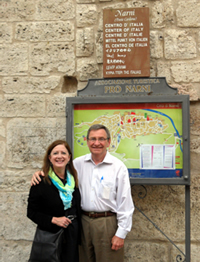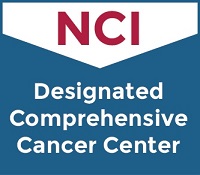Multiple Myeloma Patient Pays It Forward
If you live in the Western Maryland town of Cumberland and are diagnosed with a type of blood cancer called multiple myeloma, you probably know John Burkey.
Burkey has a wealth of practical and helpful knowledge to share with those who, like him, are diagnosed with this disease of cells in the bone marrow. He has tapped into an informal network of dozens of fellow patients in his home town with the same diagnosis. He keeps in touch with them on a regular basis to check in, offer advice and provide emotional support. It's the ultimate case of "paying it forward."
Burkey, who recently underwent his second stem cell transplant in the Blood and Marrow Transplant Program at the University of Maryland Marlene and Stewart Greenebaum Comprehensive Cancer Center after being in remission for more than six years, is convinced that a deliberate and pro-active approach to dealing with the disease and its often challenging course of treatment is the best defense against becoming overwhelmed by it.
"Dr. (Saul) Yanovich told me that the high-dose chemotherapy drugs used to destroy as many cancer cells as possible before my transplant would take a heavy toll on my healthy cells and produce some unpleasant side effects, but would ultimately allow the procedure to be a success," says Burkey. In his case, his own stem cells were harvested from his peripheral blood (an autologous transplant), and then re-introduced into his body once the chemo had done its job.
Burkey found that a deliberate and structured daily regimen helps keep him positive and motivated during the extended stay in the hospital while his immune system is depressed and his medical team monitors his blood counts to see if the stem cells begin reproducing as healthy new blood cells.
"I recommend to people that they take a hot shower every morning, then, get dressed; don't hang around in pajamas all day," he says. He makes a point of walking the halls of the BMT unit, and can tell a visitor exactly how many steps it takes to make the rounds of his twice-daily walk. When he is feeling well enough, he also rides an exercise bike in the fitness room provided for patients on the unit.
Burkey also strives to stay engaged in the outside world. From his hospital room, he relies on his cell phone and computer to check e-mail, monitor his furniture business back home and reach out to and communicate with other multiple myeloma patients and their families.
When he learns that a patient in the network is about to undergo his or her transplant, he presents them with a "goodie bag" full of items that he found were helpful when he had his own transplants. There's lip balm for dry lips as well as pink wintergreen mints and a Vicks inhaler - both of which he's found help mask the unpleasant taste that lingers after transplant from the freezing solution used to preserve the cells - hand sanitizer, a humorous or inspirational book and other comforting essentials. It is a thoughtful and practical gesture from someone who has "been there."
"I am more than happy to share my experience with others. I'm honest with people about what they can expect, both the good and the bad. It helps reduce their fear of the unknown, takes away some of the apprehension. We are all at different stages of this process, but we all still help each other. Staying in touch is a powerful source of encouragement," he says.
For more information about the diagnosis or treatment of multiple myeloma, or about the Blood and Marrow Transplant Program at the University of Maryland Greenebaum Comprehensive Cancer Center, please call 1-800-888-8823 or 410-328-7904.



